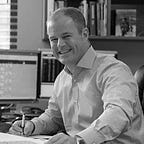Why Freedom is the Key Ingredient to Economic Growth.
In the Caribbean sits the tiny island of Nevis. With a dormant volcano and black sand beaches, Nevis played a role in the growing of sugar cane and production of rum that was part of the British Empire’s Triangle Trade. However, one of the island’s most famous “exports” was Alexander Hamilton. While Hamilton is often considered the father of American capitalism, few men of his time could have foreseen how the capitalism he endorsed would end up facilitating many of the freedoms that we enjoy today.
The life of Hamilton was captured in Ron Chernow’s superb biography, Hamilton, and his fame was later cemented by Lin-Manuel Miranda’s Broadway musical. Hamilton was brilliant and often ahead of his time. His life on Nevis made him an early abolitionist and a strong advocate for a Constitution that would limit government authority. “Give all the power to the many, they will oppress the few. Give all the power to the few, they will oppress the many,” Hamilton said.
The Federalist Papers provides insight into how well-versed Hamilton was on historical democratic systems, including what worked and what didn’t work. He knew that a free market required personal freedom and the protection of property. It was a revolutionary idea that was later explored by Milton Friedman in his 1962 book, Capitalism and Freedom. While the material may be dated, Friedman provides a compelling argument. “If economic power is kept separate from political power,” he writes, “it can serve as a check and counter to political power.” (What Friedman failed to mention was that the separation can serve as a check on economic power as well).
Friedman is often criticized for his 1993 essay “Why Government is the Problem,” which became an infamous quote attributed to President Ronald Reagan, whom Friedman advised. The essay provides a conservative argument against socialism and is a worthy read, regardless of one’s personal politics. Much like in Capitalism and Freedom, Friedman outlines areas where government power and economic power combine to control markets at the expense of the consumer.
In the United States, the separation between political and economic powers has not always been clear. In the 1890’s, stockholders of several companies would sometimes form collectives called trusts. These trusts had enormous political power and pushed for laws which prevented organized labor. They blocked legislation that addressed abuses by the trusts, including environmental pollution, poor working conditions and child labor laws. While trusts varied by industry, their intent was the same: to control prices, prevent competition and pass laws favorable to the trusts. Only through antitrust legislation was the U.S. able to diminish the influence that trusts had over Congress. Some would argue that several of today’s largest corporations are akin to the 1890’s trusts.
For Friedman, when government gets too big, political and economic forces can combine, causing personal freedoms to suffer. Yet, Friedman knew that an effective government is essential to a free market, setting the rules of the game and serving as an umpire, interpreting and enforcing the rules. The key is that in a capitalist society, the government is not a player on the field, but a third party constrained by checks and balances.
Critics of Friedman’s work (and there are many) note that contrary to what he claims, government regulation is not a bad thing as long as it is kept in check. However, the biggest flaw in Friedman’s work is that he fails to explore how the Constitution, which clearly defines the rights and freedoms of all people, serves as the keel to the economic vessel that capitalism creates. According to the CATO Institute, the protection of property is outlined in the Fifth Amendment’s Takings Clause: “…nor shall private property be taken for public use, without just compensation.” The Fifth Amendment also states that no person shall “be deprived of life, liberty, or property, without due process of law.” The founding fathers made these rights elements of the Constitution so as to prevent the alignment of political and economic powers that often form in a society, regardless of its economic system. The protection of property is a cornerstone of capitalism. Likewise, it is impossible to think of capitalism without the protection of personal freedoms.
Understanding the relationship between economic power and political power is critical for investors. Countries with little separation of political and economic powers often have little-to-no property rights and poor individual freedoms. These same nations also tend to have slower economic growth than those with greater freedoms. When one factors in a country’s political freedoms, the narrative of how “attractive” an investment may be is altered. Over ten years ago, many investors were encouraged to invest overseas, particularly in China. (We opted to stay with U.S.-traded equities.) In the last ten years, the Hang Seng (Chinese stock market index) has grown 55%, while the U.S.-based S&P 500 Index grew 220%.
Few would disagree that “political risk” can greatly influence an investment; however, it is often discounted by investors. While Friedman is considered an advocate for less government at all costs, Hamilton understood the perils of this approach. When asked why the United States needed a strong federal government, Hamilton responded, “Why has government been instituted at all? Because the passions of men will not conform to the dictates of reason and justice, without constraint.” It has been the separation of political and economic powers that has shaped our nation, and while the path has been rocky at times, it has given us the freedoms we enjoy today and the power to seek those we desire for tomorrow.
